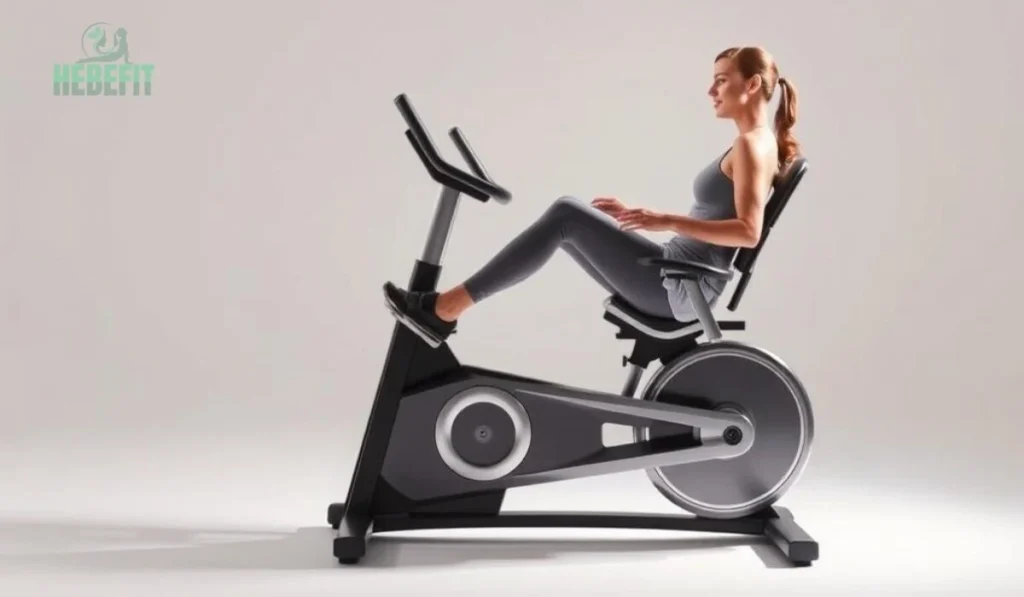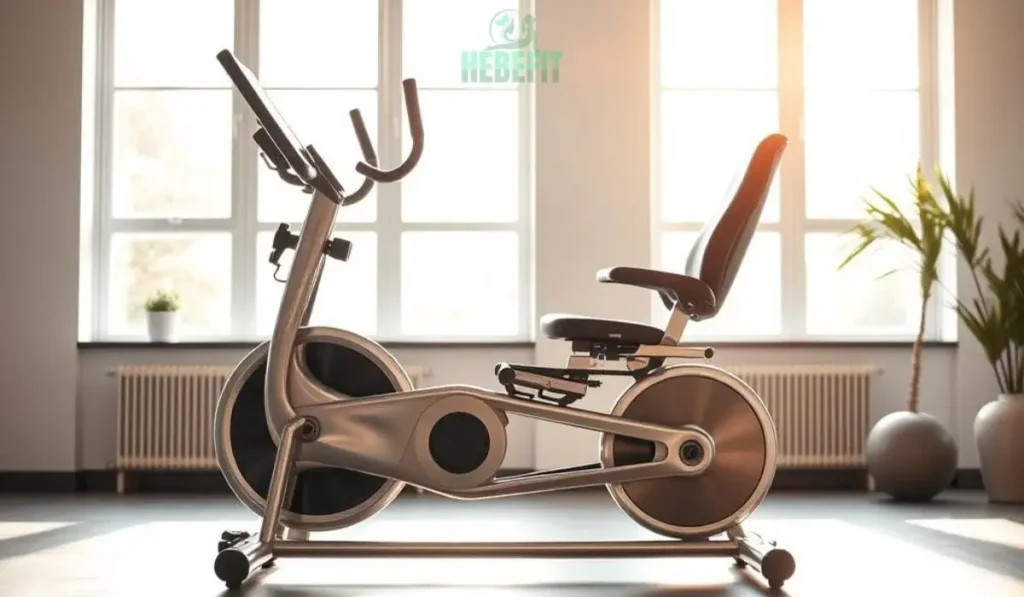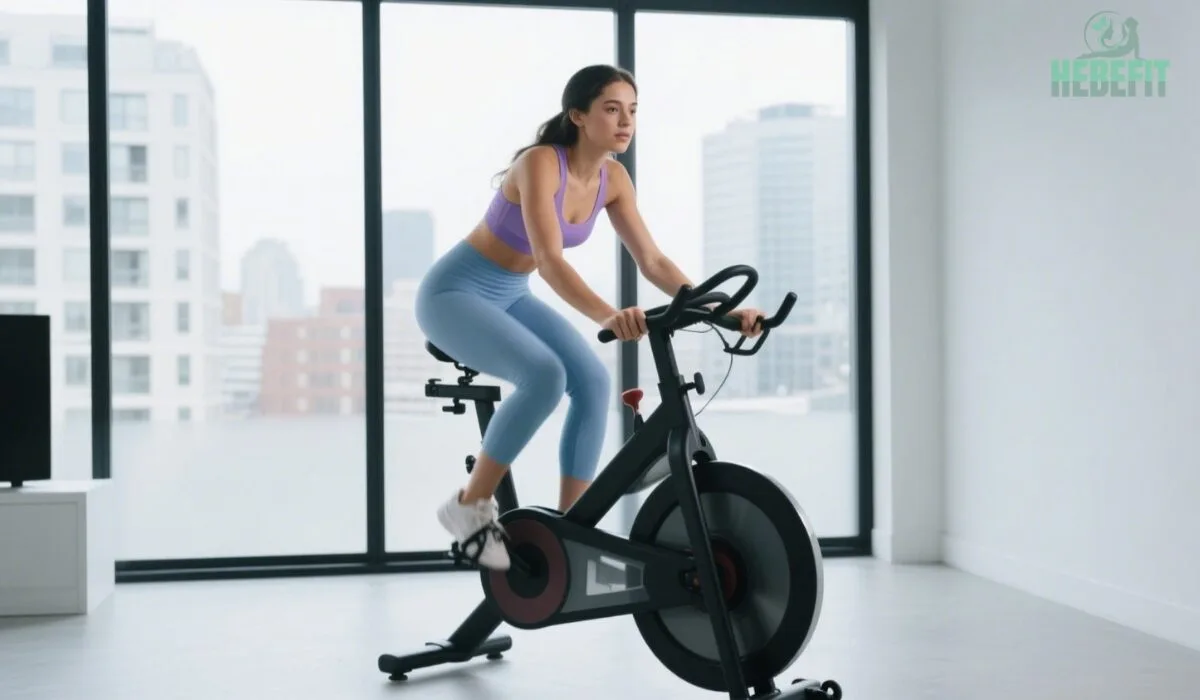Looking for a way to boost your heart health and build muscle without hurting your joints? Recumbent bike exercise is a great choice. It’s easy on the body and works for everyone, from newbies to pros.

Adding recumbent bike exercise to your routine can really pay off. It’s perfect for getting better at cardio and muscle strengthening. Plus, you’ll love the comfortable bike design.
Key Takeaways
- Low-impact fitness suitable for all fitness levels
- Effective for improving cardiovascular health
- Strengthens muscles without excessive joint strain
- Comfortable bike design for a pleasant exercise experience
- Enhances cardio and muscle strengthening capabilities
Is Recumbent Bike Good Exercise?
Is the recumbent bike a good choice for exercise? It’s a low-impact option compared to traditional cycling. Its design offers comfort and benefits for many users. Recumbent bikes improve cardiovascular health without straining the body too much.

How it compares to upright bikes
Recumbent bikes and upright bikes meet different needs. Upright bikes are traditional and liked by experienced cyclists. Recumbent bikes, however, offer a more comfortable ride. They’re great for those with back issues or who enjoy a relaxed cycling experience.
The reclined position on a recumbent bike eases back and joint strain. This makes it easier for many to use.
Suitable for beginners, seniors & injury recovery
The recumbent bike is excellent for beginners, seniors, and those recovering from injuries. It’s low-impact, providing a gentle workout. This is good for those with existing conditions.
Seniors can keep their heart healthy without stressing their joints. Beginners find it easy to use and comfortable. Those recovering from injuries can exercise safely without overdoing it.
Endurance, strength, and cardiovascular benefits
Regular use of a recumbent bike boosts endurance, strength, and cardiovascular health. It’s low-impact, reducing injury risk. This allows for longer, more frequent workouts.
As you ride more, you’ll see your fitness improve. You’ll have more stamina and a stronger heart.
In summary, the recumbent bike is a great exercise option. It benefits many, from beginners to seniors and those recovering from injuries. Adding it to your routine can be a smart choice.
Choosing the Right Bike for Your Fitness Goals
When it comes to improving your fitness, choosing the right bike is crucial. Different types of bikes offer unique benefits, and understanding these can help you make an informed decision. Let’s explore the pros and cons of each type to find the best bike exercise for your fitness goals.
Recumbent Bike
The recumbent bike is a popular choice for those looking to target their lower body. It provides a comfortable seating position and allows for a full range of motion, making it ideal for strengthening the legs and glutes. Additionally, the recumbent bike is low-impact, reducing the risk of injury and making it suitable for individuals with joint issues.
Upright Bike
The upright bike, also known as a spin bike, is designed to engage the entire body. It promotes a standing position, which helps improve cardiovascular fitness and burn calories. The upright bike also targets the core muscles, enhancing overall stability and balance. It’s an excellent choice for those looking to improve their endurance and cardiovascular health.
Spin Bike
The spin bike is a variation of the upright bike and offers a similar workout experience. It provides a high-intensity, calorie-burning workout that targets the legs, glutes, and core. The spin bike is known for its ability to simulate outdoor cycling, making it a great option for those who enjoy the feeling of riding on different terrains.
When choosing the right bike for your fitness goals, consider your personal preferences and the specific areas you want to target. Whether you prefer the comfort of a recumbent bike, the full-body engagement of an upright bike, or the high-intensity workout of a spin bike, there’s a bike exercise that can help you achieve your fitness goals.

| Type of Bike | Pros | Cons |
| Recumbent Bike |
- Targets lower body
- Comfortable seating position
- Low-impact
- May not engage upper body as much
- May not be as effective for calorie burn
| Upright Bike |
- Engages entire body
- Improves cardiovascular fitness
- Targets core muscles
- May be less comfortable for some users
- May not be as effective for lower body
| Spin Bike |
- High-intensity workout
- Targets legs, glutes, and core
- Simulates outdoor cycling
- May be more challenging for beginners
- May require more effort to maintain proper form
Recumbent Bike Exercise Plan
Your recumbent bike can be a powerful tool for fitness when used as part of a structured exercise plan. A well-designed plan helps you achieve your fitness goals efficiently and safely.
Weekly Plan for Beginners, Intermediate & Advanced
To get started, you’ll need to determine your fitness level and create a weekly plan accordingly. Here’s a general guideline:
- Beginners: Start with 20-minute sessions, three times a week. Gradually increase the duration and intensity as you become more comfortable.
- Intermediate: Aim for 30-minute sessions, four times a week. Incorporate interval training to boost cardiovascular benefits.
- Advanced: Ride for 40 minutes, five times a week. Include high-intensity interval training (HIIT) to maximize calorie burn and cardiovascular improvements.
Time, Intensity, and Resistance Level Suggestions
Adjusting time, intensity, and resistance levels is crucial for a progressive workout. Here are some tips:
- Time: Increase your ride time by 10 minutes every two weeks if you’re a beginner or intermediate user.
- Intensity: Monitor your heart rate and adjust the intensity to reach 60-80% of your maximum heart rate.
- Resistance Level: Increase resistance to build strength and endurance. Start with lower resistance and gradually increase it as you get stronger.
Progress Tracking Tips
Tracking your progress is essential to staying motivated and achieving your fitness goals. Consider the following methods:
- Use a fitness tracker or mobile app to monitor your heart rate, distance, and calories burned.
- Keep a workout log to track your progress over time.
- Set specific, measurable goals and celebrate your achievements.
| Fitness Level | Weekly Frequency | Session Duration | Intensity Level |
| Beginner | 3 times | 20 minutes | Low-Moderate |
| Intermediate | 4 times | 30 minutes | Moderate-High |
| Advanced | 5 times | 40 minutes | High |
Recumbent Bike Exercise Guide
Using a recumbent bike right is more than just pedaling. It’s about setting it up right and riding with the right technique. Here’s how to make sure you get the best workout.
Step-by-Step Setup Instructions
First, adjust the seat height so your knee bends a bit when the pedal is down. Then, tweak the backrest for good lower back support. Make sure the handlebars are comfy, so you can ride easy.
Proper Posture and Safety Measures
It’s key to ride with the right posture. Keep your back straight, engage your core, and pedal with your feet right. For safety, use the safety clip or strap on your feet and keep loose clothes tied back.
- Make sure your knees and feet are in line to avoid strain.
- Don’t lean too far forward or backward to protect your joints.
- Choose a resistance that fits your fitness level.
How Long to Ride and How Often
How long and how often you ride depends on your goals and fitness level. Start with 20-30 minutes, 2-3 times a week if you’re new. As you get stronger, you can ride longer and more often.
| Fitness Level | Riding Duration | Frequency |
| Beginner | 20-30 minutes | 2-3 times a week |
| Intermediate | 30-45 minutes | 3-4 times a week |
| Advanced | 45-60 minutes | 4-5 times a week |
Stick to these tips and adjust as you get better. This way, you’ll get the most out of your recumbent bike workouts and reach your fitness goals.
Recumbent Bike Exercise Tips
Boost your fitness with these expert tips for using a recumbent bike. It’s key to mix strategies that boost performance and safety.
Warm-up and Cooldown Tips
Begin with a good warm-up to get your muscles ready. A 5-minute light pedaling can boost blood flow and prevent injuries. Also, a cooldown phase helps slow down your heart rate and eases muscle soreness.
For a better warm-up, try dynamic stretches like leg swings and arm circles. For cooldown, use static stretches like hamstring and quadriceps stretches.
Maintaining Motivation
Keeping motivated is vital for any workout. Listening to music or watching your favorite show can make it more fun. Setting goals and tracking your progress also helps.
To stay motivated, mix up your routine. Try changing the resistance or adding interval training.
Using Music or Screen Time While Riding
Adding music or screen time to your bike ride can make it better. Music can take your mind off fatigue and lift your mood. Watching a show can also make time go by faster.
When using screens, make sure they’re secure and in your line of sight. Look into fitness apps for tracking and entertainment during your ride.
Recumbent Bike Exercise Benefits
Recumbent bike exercise has many benefits. It’s great for those who want to work out without putting too much stress on their joints. It also helps improve your heart health.
Low Impact on Joints
One big plus of recumbent bike exercise is how easy it is on your joints. It’s perfect for people with joint pain or arthritis. This way, you can keep exercising without making your joint problems worse.
Boosts Cardiovascular Health
Using a recumbent bike regularly can really boost your heart health. It makes your heart rate go up and improves blood flow. This strengthens your heart and lungs, helping to lower the risk of heart disease.
Aids in Toning Legs and Glutes
Recumbent bike exercise is also good for toning your legs and glutes. You can adjust the resistance to work different muscles. This helps build strength and endurance in your lower body.
| Benefits | Description |
| Low Impact | Reduces stress on joints, ideal for individuals with joint pain or arthritis |
| Cardiovascular Health | Improves heart health, increases blood flow, and reduces risk of heart disease |
| Muscle Toning | Effective for toning legs and glutes through adjustable resistance levels |
Recumbent Bike Exercise for Weight Loss
Losing weight with a recumbent bike is more than just pedaling. It’s about burning calories and boosting your metabolism. To lose weight, you need to know how to burn more calories during exercise. Also, eating healthy is key.
Calorie Burning Estimate per Session
The calories burned on a recumbent bike depend on your weight, workout intensity, and how long you exercise. A 30-minute moderate workout can burn 200-400 calories. To lose more weight, aim for sessions that burn 400-600 calories.
Here’s a rough idea of calorie burn based on weight and intensity:
| Weight | Low Intensity (30 mins) | Moderate Intensity (30 mins) | High Intensity (30 mins) |
| 120 lbs | 150 calories | 250 calories | 400 calories |
| 150 lbs | 200 calories | 300 calories | 500 calories |
| 180 lbs | 250 calories | 350 calories | 600 calories |
How to Pair Bike Workouts with Diet
Combining bike workouts with a balanced diet is key for weight loss. Aim for a calorie deficit by eating less and exercising more. Eat nutrient-dense foods like veggies, lean proteins, and whole grains.
If you burn 500 calories per session, eat 500 calories less each day. This creates a total calorie deficit of 1000 calories daily.
High-Intensity Intervals for Fat Burn
Adding high-intensity interval training (HIIT) to your bike workouts boosts fat burning. HIIT involves short, intense exercise followed by rest or low-intensity exercise. This method burns calories during and after exercise.
To do HIIT on a recumbent bike, alternate 1 minute of intense pedaling with 2 minutes of low-intensity pedaling. Repeat for 20-30 minutes to burn more fat.
Final Thoughts on Recumbent Bike Exercise
Adding recumbent bike exercise to your routine can really change your game. It’s gentle on your joints and boosts your heart health, endurance, and works your legs and glutes.
Recumbent bike exercise fits everyone, from newbies to pros, and is great for seniors and those healing from injuries. It can make a big difference in your health and fitness if you do it every day.
To get the best results, set up your bike right, keep good posture, and adjust the intensity and resistance as you get better. With regular use, you’ll see a big improvement in your health and fitness.
So, make recumbent bike exercise a key part of your daily routine. Enjoy the safe, effective, and easy way to stay fit.
FAQ
Is a recumbent bike good for exercise?
Yes, a recumbent bike is great for exercise. It offers a low-impact workout that’s easy on your joints.
How does a recumbent bike compare to an upright bike?
Recumbent bikes are more comfortable and better for those with back issues. They offer a relaxed cycling experience. Upright bikes, on the other hand, provide a traditional cycling feel.
Can I use a recumbent bike for weight loss?
Yes, a recumbent bike is good for weight loss. It helps burn calories, improves heart health, and tones your legs and glutes.
How often should I use a recumbent bike for exercise?
How often you use a recumbent bike depends on your goals and fitness level. Start with 3-4 times a week, for 20-30 minutes each session.
Are recumbent bikes suitable for seniors or individuals with injuries?
Yes, recumbent bikes are great for seniors and those recovering from injuries. They offer a low-impact workout that’s easy to use.
Can I use a recumbent bike if I have knee pain or joint issues?
Yes, recumbent bikes are good for those with knee pain or joint issues. They provide a low-impact workout that’s gentle on your joints.
How do I create a recumbent bike exercise plan?
To make a recumbent bike plan, first figure out your fitness goals and current level. Then, set a workout schedule with duration, intensity, and frequency. Adjust it as you progress.
What are the benefits of using a recumbent bike for exercise?
Using a recumbent bike has many benefits. It’s low impact on joints, improves heart health, tones your legs and glutes, and lets you customize workouts for your fitness level.










